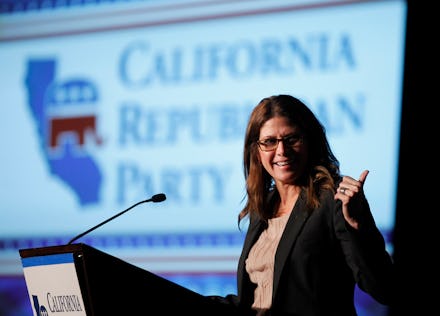4 female lawmakers allege sexual harassment in Congress, highlighting ongoing problem in politics

In accounts given to the Associated Press, four current and former female lawmakers have alleged sexual harassment by their male colleagues in Congress, highlighting a lack of mechanisms for female government officials to report assault.
Former Rep. Mary Bono (R-Calif.), told the AP that during her early years in the House of Representatives, one of her male colleagues repeatedly told her that he had fantasies of the two of them showering together.
“Instead of being ‘how’s the weather, how’s your career, how’s your bill,’ it was ‘I thought about you while I was in the shower,’” Bono said of the man, who she declined to name but said still serves in Congress. “So it was a matter of saying to him, ‘That’s not cool, that’s just not cool.’”
Former California Sen. Barbara Boxer recounted an incident that occurred in the 1980s when a male colleague made sexually suggestive comments during a hearing in what the AP described as “traditional congressional parlance,” which included a professed desire to “associate with the gentle lady.”
In Boxer’s esteem, the comments — which she said were met with laughter on the House floor, and which she later asked be removed from the record — were “about power.”
“That was an example of the way I think we were thought of, a lot of us. ... It’s hostile and embarrasses, and therefore could take away a person’s power,” she said.
Rep. Linda Sanchez (D-Calif.) confirmed a pattern among the women that have come forward so far: that the alleged harassment occurred early into their tenures in Congress, and was often perpetrated by older men.
“When I was a very new member of Congress in my early 30s, there was a more senior member who outright propositioned me, who was married, and despite trying to laugh it off and brush it aside, it would repeat. And I would avoid that member,” said said.
She added that she does not believe it pertinent to name the man in question, who remains in Congress, but said that she frequently warns other female members of the House about him.
“I just don’t think it would be helpful” to publicly name the lawmaker in question, Sanchez told the AP. “The problem is, as a member there’s no HR department you can go to, there’s nobody you can turn to. Ultimately they’re employed by their constituents.”
While Capitol Hill staffers have spoken out about harassment by lawmakers and aides in the past, accounts from female lawmakers who claim to have experienced the same treatment have been scarce.
The decisions of the four lawmakers to come forward with their stories is precipitated by a slew of allegations against disgraced former Hollywood producer Harvey Weinstein, the visibility of which has prompted women across the country to speak to their own experiences with sexual harassment.
The so-called “Weinstein effect” has also spread to statehouses across the country, with hundreds of local lawmakers, lobbyists and consultants coming forward in recent weeks to shed light on the pervasive problem of harassment in politics — still very much a male-dominated sector.
“Every industry has its own version of the casting couch,” reads an open letter alleging harassment against female lawmakers and political operatives that was circulated recently in Illinois. “Ask any woman who has lobbied the halls of the Capitol, staffed Council Chambers, or slogged through brutal hours on the campaign trail. Misogyny is alive and well in this industry.”
And for as long as women remain the minority group in politics — female lawmakers make up only about 20% of the population in the House and Senate, according to the AP — there’s little reason for anyone to believe a shift in power dynamics is coming.
“It is a man’s world, it’s still a man’s world,” Bono said. “Not being a flirt and not being a bitch. That was my rule, to try to walk that fine line.”